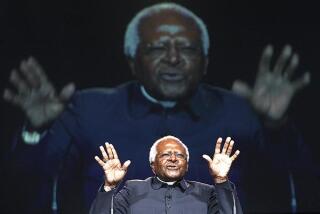Julius Nyerere; Former President of Tanzania Led Country to Independence
- Share via
NAIROBI, Kenya — Former Tanzanian President Julius Nyerere, whose principle of umoja, or unity, instilled in his people a sense of brotherhood notably absent in a continent often scarred by ethnic strife, died of leukemia Thursday. He was 77.
The respected elder statesman, who led his country to independence from Britain in 1961, once told a U.S. newspaper: “My success is building a nation out of this collection of tribes,” noting that his real wish had been to create an East Africa federation.
Nyerere had been undergoing treatment for chronic lymphocytic leukemia at a London hospital when he suffered a massive stroke.
“I know the death of the father of the nation is going to shock and dismay all Tanzanians,” said Tanzanian President Benjamin Mkapa. “Others will be filled with great doubt and fear.”
Popularly known as “Mwalimu”--Kiswahili for “teacher”--Nyerere was revered as the father of his nation for securing independence for what was then called Tanganyika. Elected the country’s first president in 1962, Nyerere chose socialism as a prospective path to development for Tanzania, renowned for its magnificent parks and wildlife reserves. But critics accused him of turning the potentially rich East African nation into one of the continent’s poorest.
When he voluntarily stepped down in 1985, handing power to a constitutionally chosen successor--a rarity among many of the continent’s leaders--Nyerere candidly admitted that his one-party, socialist policies had failed.
A system of collective farming known as ujaama had battered Tanzania’s agriculture-based economy, and the country’s industries were barely limping along under Nyerere’s nationalization policy.
But the venerable politician--the author of eight books on development and socialism in Africa--found credit elsewhere, by promoting nationwide health care and education, and ensuring stability in Tanzania.
Nyerere was known as a benevolent dictator. He wasn’t known for harsh human rights abuses, and he lived modestly.
Although officially retired from politics, Nyerere continued to wield influence over Tanzania’s choice of leaders and the direction of the ruling party.
His picture still hangs alongside that of Mkapa, the country’s current leader, in many public offices.
Nyerere, a powerful orator with a penchant for mirth, also played an advisory role in African affairs, most recently leading regional efforts to bring peace to Burundi, which borders Tanzania.
He was unable to attend the latest round of peace negotiations, but earlier this year he expressed anger and frustration over the slow pace and lack of substantial progress of the talks.
Although he was a staunch socialist, Nyerere’s integrity and intellect also won him several capitalist friends, including the United States, which pumped billions into Tanzania.
President Clinton remembered Nyerere on Thursday as “a pioneering leader for freedom and self-government in Africa.”
“President Nyerere dedicated his life to a vision rooted in the belief that all people have a responsibility to protect those who cannot protect themselves,” Clinton said in a statement. “President Nyerere’s legacy of determination and compassion lives on in the generous people of Tanzania today.”
U.N. Secretary-General Kofi Annan said in a statement: “President Nyerere was one of the giants of the 20th century African liberation movement.
“As a leader who brought his country to independence without bloodshed, by uniting all the people in a single nonviolent but irresistible movement, he inspired a whole generation of Africans struggling for freedom throughout the continent.”
British Prime Minister Tony Blair praised Nyerere as “a leading African statesman of his time” who “will be missed by his country, his continent and the international community.”
The son of a local chief--and one of two dozen children--Nyerere was born in the village of Butiama near Lake Victoria. Though obliged to herd cattle in his early years, he dreamed of getting an education.
Local secondary school was followed by an undergraduate program at Uganda’s once-prestigious Makerere University, and a master of arts degree from Edinburgh University in Scotland.
Nyerere swapped a career in teaching for politics in 1954, when he became president of the nationalist Tanganyika African National Union. He was the architect of Tanganyika’s union with the neighboring island of Zanzibar after the former’s independence. The two nations became the United Republic of Tanzania.
Many Tanzanians expressed fear that the already fragile union between Tanzania and Zanzibar would disintegrate with Nyerere’s demise.
Nyerere’s body will be flown to Tanzania for burial, and a 30-day national mourning period has been declared. The veteran statesman, a Roman Catholic, is survived by his wife, Maria, and eight children.
Times staff writer John J. Goldman at the United Nations contributed to this report.
More to Read
Sign up for Essential California
The most important California stories and recommendations in your inbox every morning.
You may occasionally receive promotional content from the Los Angeles Times.














